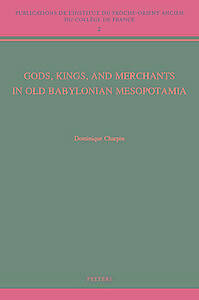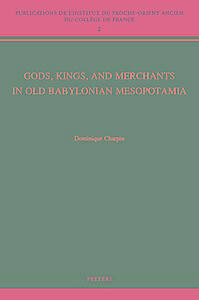
- Afhalen na 1 uur in een winkel met voorraad
- Gratis thuislevering in België vanaf € 30
- Ruim aanbod met 7 miljoen producten
- Afhalen na 1 uur in een winkel met voorraad
- Gratis thuislevering in België vanaf € 30
- Ruim aanbod met 7 miljoen producten
Zoeken
Gods, Kings, and Merchants in Old Babylonian Mesopotamia
D Charpin
Paperback | Engels | Publications de l'Institut du Proche-Orient Ancien du Collège de France | nr. 2
€ 41,00
+ 82 punten
Omschrijving
Gods, kings and merchants, a way of designating religion, politics and the economy: three spheres which in the modern world are quite distinct, even if they do interact constantly. The aim of this book is to show that their boundaries were far more fluid in the Mesopotamian civilisation: gods could act as money lenders, kings could invoke divine will to refuse extradiction, the dead could serve as a reference for how the living should behave, and wealthy merchants could live in residences modelled on those of kings... This civilisation preceded the Greek miracle which Jean-Pierre Vernant has quite correctly defined as a process of change which led to the emergence, as distinct areas, of the blueprints for the economy, politics, law, art, science, ethics, and philosophy. In a direct continuation of his earlier book published in 2010, Writing, Law, and Kingship in Old Babylonian Mesopotamia, D. Charpin here examines in greater depth the situation which existed in Mesopotamia in the first half of the second millennium BC, using texts discovered in numerous archives throughout the entire Near East, especially those found at Mari eighty years ago.
Specificaties
Betrokkenen
- Auteur(s):
- Uitgeverij:
Inhoud
- Aantal bladzijden:
- 223
- Taal:
- Engels
- Reeks:
- Reeksnummer:
- nr. 2
Eigenschappen
- Productcode (EAN):
- 9789042932753
- Verschijningsdatum:
- 19/05/2015
- Uitvoering:
- Paperback
- Formaat:
- Trade paperback (VS)
- Afmetingen:
- 157 mm x 239 mm
- Gewicht:
- 362 g

Alleen bij Standaard Boekhandel
+ 82 punten op je klantenkaart van Standaard Boekhandel
Beoordelingen
We publiceren alleen reviews die voldoen aan de voorwaarden voor reviews. Bekijk onze voorwaarden voor reviews.











